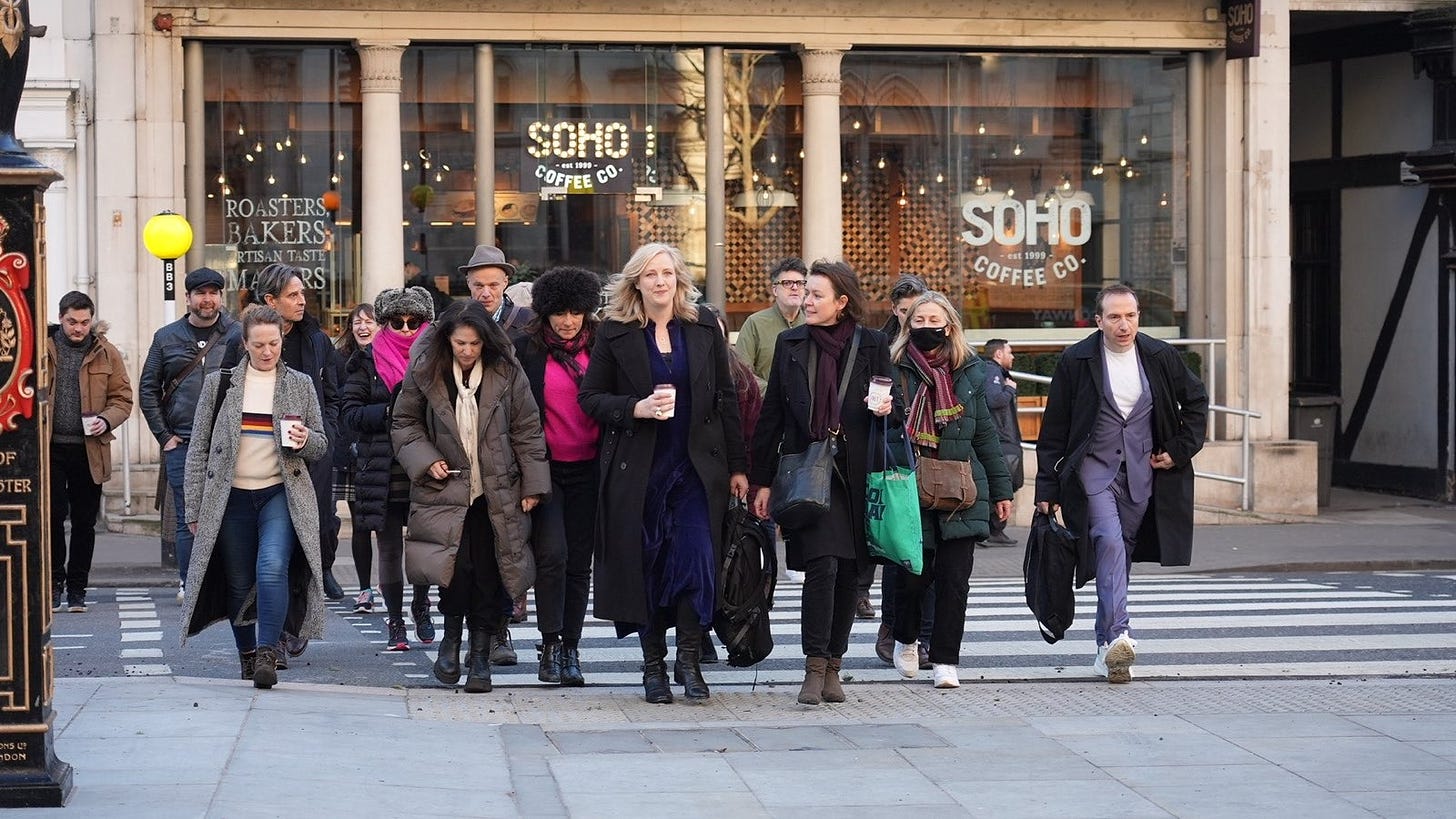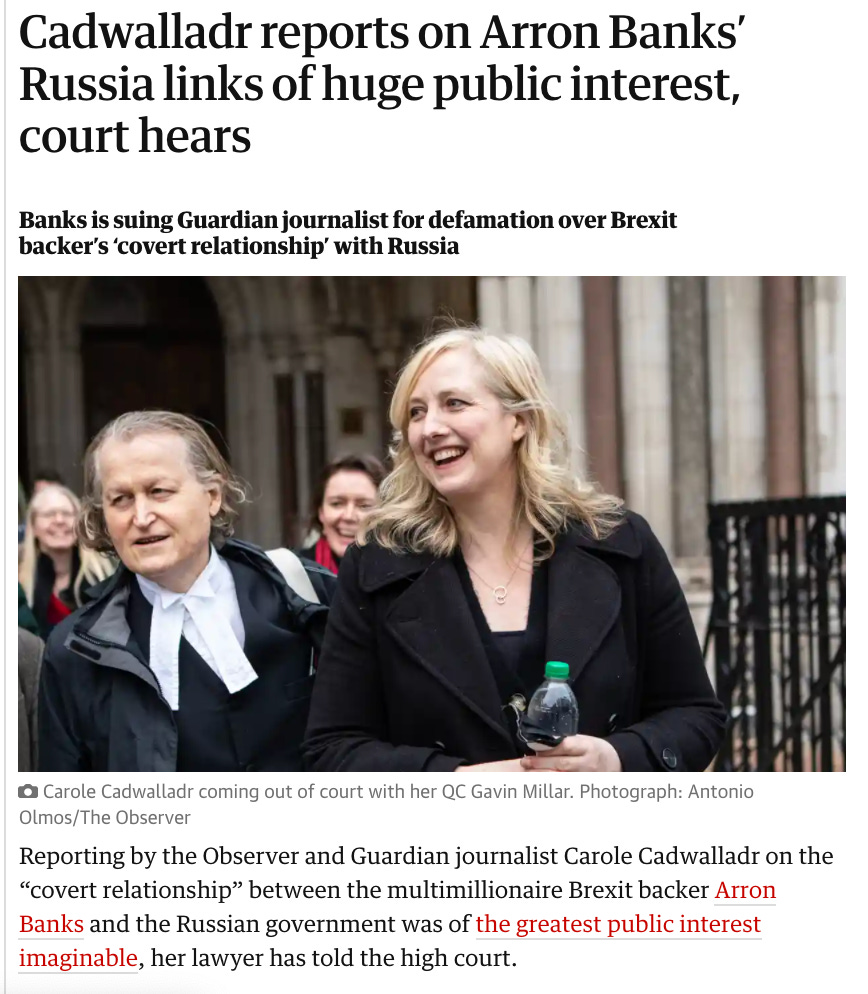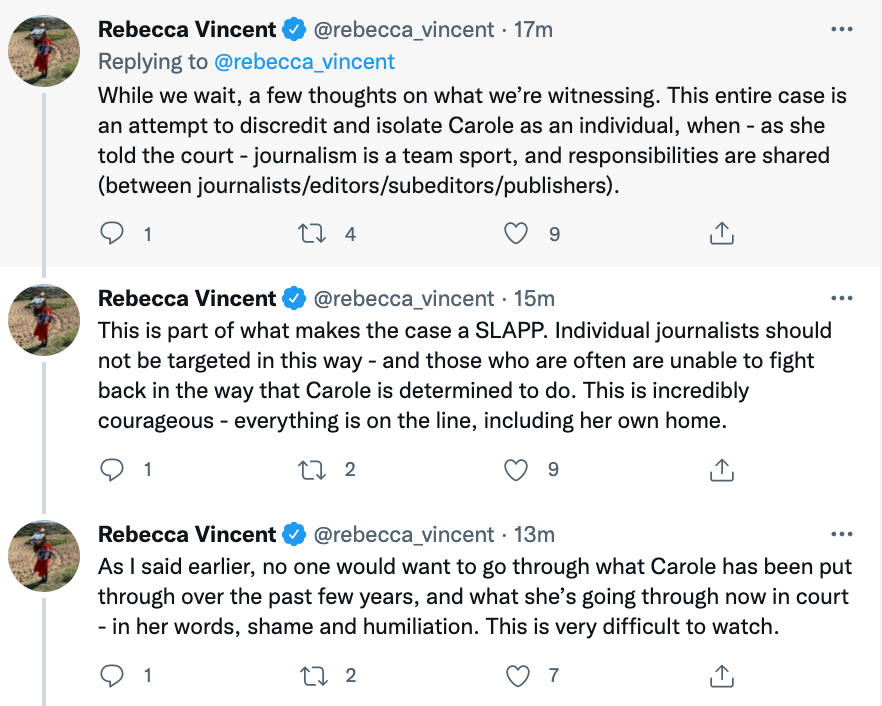Public interest journalism on trial in 'libel capital of the world'
There's more at stake than who picks up the legal bill in the trial of Banks vs. Cadwalladr. Press freedom is on the stand too
Welcome to Keeping the Receipts — a newsletter from the Citizens, this week written by Joanne O’Connor. You can read about the mission behind this here. If you like what you see, consider forwarding it to a friend or two. And if you’ve been reading it for free and want to support our mission, please consider signing up to the paid version.
While preparing her defence against the libel lawsuit brought by the multi-millionaire businessman and Brexit backer Arron Banks, a lawyer warned Carole Cadwalladr that there were “no winners” in a libel trial, the best you could hope for was “not to lose”. The final verdict on Banks vs. Cadwalladr may not be reached for some weeks, but these words will ring true for anybody who witnessed the gruelling proceedings unfolding in Court 13 of the Royal Courts of Justice over the past week.
The court’s public gallery is closed due to Covid restrictions, so those who wanted to follow the trial were banished to a basement overspill court in a far-flung corner of the Gothic Revival building to watch via video link as the journalist was subjected to a two-and-a-half day cross examination.
Banks, who funded the Leave.EU campaign, is suing Cadwalladr over a remark she made during a TED talk in April 2019 and a related Tweet in which she accused him of lying over his relationship with the Russian state.
Banks took the stand first, answering, or rather, repeatedly failing to answer, questions put to him by the defence counsel. The main thrust of the questioning was to establish the exact number and nature of Banks’s interactions with the Russian ambassador. Was it the ‘one boozy lunch and a cup of tea’ version of events that Banks had previously put forward or was there more to the relationship? Time and again Banks fell back on the assertion that he couldn’t recall the details, at one point drawing an analogy between the “chaotic” aftermath of the Brexit referendum and the First World War: “What you are trying to ask me to do is to say where did each bullet go, who fired it and at what target.”
On Monday afternoon it was Carole’s turn to take the stand. The journalist, who won the Orwell Prize and a nomination for a Pulitzer Prize for her investigative reporting into the role of big data and social media platforms in undermining democracy, is defending the case on the grounds that the remarks she made during the Ted speech were in the public interest.
The case is compelling for a number of reasons, not least because it cuts across some of the biggest and most contentious stories of recent years – the Cambridge Analytica scandal; potential Russian interference in the US election and Brexit referendum; the funding of the Leave.EU campaign; and the increasing role played by social media platforms in our democratic processes. But it also raises a number of serious issues around press freedom in this country.
As the trial commenced, 16 different organisations, including Reporters Without Borders (RSF), Index on Censorship, English PEN and Article 19, released a statement in support of Carole and calling for legislation to protect journalists from legal actions “intended to stifle public debate.”
Rebecca Vincent, director of international campaigns at Reporters Without Borders was at the High Court to monitor the trial and said that it had all the hallmarks of a SLAPP (strategic lawsuit against public participation) – although this was denied by Banks’s counsel in their opening statement.

“The purpose of these lawsuits...is to make examples of individuals, to make it clear that there are certain people or topics that are untouchable and to create a chilling effect,” said Vincent. “It is a very low cost way, usually, for the litigants to silence a journalist or a media outlet on something that they prefer to keep hidden.”
The issue of SLAPPs, also known as “vexatious litigation”, came to prominence after the assassination of investigative reporter Daphne Caruana Galizia in Malta in 2017. It emerged that, at the time of her death, she was facing 47 civil and criminal libel suits from various business people and politicians, filed in a number of different jurisdictions. The Guardian reported that, just months before her death, the journalist had received letters from the London office of law firm Mishcon de Reya on behalf of a client doing business in Malta.
The company is just one of a handful of blue chip London law firms offering ‘reputation management’ services to wealthy clients. This, combined with the fact that English libel laws place the burden of proof more heavily on the defendant than many other jurisdictions, have earned London a reputation as the ‘libel capital of the world’.
In a debate in parliament this week on the wider issue of ‘Lawfare and the UK Courts’, MP David Davis spoke of how Britain’s courts were being used by individuals with “exceptionally deep pockets and exceptionally questionable ethics” to “threaten, intimidate and put the fear of God into British journalists.” His comments did not relate specifically to this case.

Davis then went on to set out the devastating impact that strategic litigation can have on journalists:
“It’s not just the financial and reputational damage inflicted by these cases. Lives are also being destroyed. Defendants are unable to work. Every waking moment is spent looking over their shoulders, wondering who or what is just around the corner. This is not about legitimate recourse against journalists making mistakes. It’s about shutting down scrutiny through fear.”
In court, Carole spoke of the barrage of online harassment and abuse she has received in the last few years and how it had taken her to a “very dark place”. The extent of this harassment was the subject of a UNESCO report which outlined how she “became the target of a malign, misogynistic, disinformation-laced campaign of online violence which has grown increasingly threatening over time.”
As her editorial judgement, journalistic techniques and integrity were repeatedly called into question over the course of five days, the toll that the trial was taking became increasingly apparent.
Aside from the impact that this litigation has on individuals, there is the much wider issue of the detrimental impact it has on press freedom if journalists are deterred from reporting on certain stories or individuals.
“I think the spate of cases in recent years has already had a real chilling effect, and it's impinging on our ability to investigate some of the individuals who are involved perhaps in influence campaigns in the UK, who have been involved in eroding, essentially, democracy already if they were able to silence journalists and take them out of the game for years on end,” said Catherine Belton, special correspondent for Reuters and former Moscow correspondent for the FT.
Belton has first-hand experience of what it’s like to be on the receiving end of this kind of litigation. Following the publication of her book Putin’s People in 2020, she received a total of five lawsuits, including one from Russian billionaire Roman Abramovich, (all of which have now been resolved or dropped).
“We were told by lawyers at one newspaper that ‘we try not to write about Russian oligarchs at all’ because they fear litigation. They just don't want to have to deal with it. It's too time consuming, it's too costly. And even if they're insured, it's just too much to handle,” said Belton.
“There has to be a way of better protecting [journalists] because it's more important than ever that there can be free, impartial and rigorous investigative journalism into the backgrounds of some of these people when the UK's own Security and Intelligence Committee has pointed out the dangers to our own democracy,” she added.
One of the proposed measures which has been put forward to protect journalists is anti-SLAPP legislation which could filter out many of these cases before they come to court.
“The UK urgently needs reforms so that investigative journalists who are looking into matters of public interest are not subject to legal threats that are costly and intimidatory and are often dragged over months, if not years,” said Susan Coughtrie, project director at the Foreign Policy Centre and co-chair of the UK Anti-SLAPP working group. “We also need a system where access to justice is not just the purview of the super rich, but actually available to everyone.”
Another way of tackling the issue, according to Coughtrie, is for journalists to speak out when they are targeted in this way. “Most of the time we only hear about these cases when they reach court stage. But actually, that's really the tip of the iceberg.”
She also called for regulatory reform of UK law firms: “Ultimately, they are the ones that are facilitating these legal threats, and they need to make sure that they are not being complicit in suppressing information that's in the public interest. A lot of cases that we see in the UK that we would classify as SLAPPs are linked to investigations into financial crime and corruption. So a lot more needs to be done by UK law firms to make sure that they are taking the proper due diligence.”
Yesterday in court, the judge heard the closing arguments for both sides. But it’s not just Carole’s reputation or her home which are on the line. A functioning democracy depends on the ability of journalists to hold power to account. To investigate corruption. If those with deep pockets can use and abuse our courts of law to intimidate and silence those who attempt to investigate them, it will have profound consequences for our society. For those who have followed this trial closely, it’s clear that the only real winners here are the law firms. The best the rest of us can hope for is not to lose.








Interestingly I was ranting on Twitter this morning BOTH about the corrupt and toxic relationship between corporate media and political power in Britain's non democracy, as well as the Kremlin funded psychological warfare offensive that delivered BREXIT and Johnson's corrupt cabal to power. Carole Cadwalladr is among a handful of genuine investigative journalists in the UK who has inherited the mantle from old timers like Nick Davies (sorry Nick but we ARE mates!) and the show trial against her shows precisely what happens when journalists actually do their job in holding truth to power!
It happens at local level too ~ not to the same extent: when I was trying to save a piece of rewilded land from local town council's plan to bulldoze & develop, I wrote a letter to th paper detailing the crossover status of one councillor between local, district and a housing company. Next thnig, he tried to sue me 'in the name of the whole council'. Luckily, it was blatant bullying and attempt to scare me off and a good lawyer friend wrote a scathing letter on my behalf. The man was a Tory. I think that says it all.